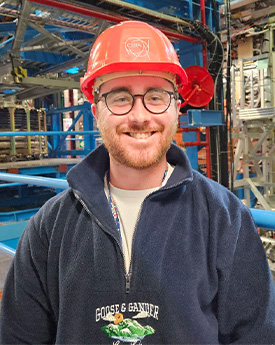Dr Harald Fox
Senior LecturerResearch Interests
The Higgs boson!I am a member of the ATLAS collaboration since 2004. In July 2012 we found a new boson at a mass of 125 GeV that is a candidate for the long sought after Higgs boson! My interest is in the final state where the Higgs boson decays into two tau leptons which decay themselves hadronically. Establishing the decay of the new boson into fermions directly is important to characterise the particle. In addition this decay mode allows us to look at the CP properties of this boson: we know that there is not enough matter-antimatter asymmetry in the Standard Model to explain the universe and new sources are needed! Tracking and vertexing is of particular interest for me in this decay mode as tau leptons have a relatively long lifetime. A better understanding in this area will help to improve the mass resolution.
We also use the Higgs boson as portal to new physics beyond the Standard Model. New heavy Higgs-bosons or Randall-Sundrum gravitons may decay into two light (SM) Higgs bosons. While di-Higgs production is predicted by the Standard Model and can be used to determine the shape of the Mexican hat symmetry breaking potential an enhanced cross section may signal new physics.
The silicon tracker of ATLAS is another of my research interests. I already built endcap modules for the present SCT. A luminosity upgrade of ATLAS is planned and for this a completely new tracker is required. We are investigating radiation hard silicon for this upgrade. Cooling of silicon staves is another aspect of my research for the ATLAS upgrade.
I have also developed an interest into Muon Tomography, a new method to scan either large or dense objects. Find a background article on the discovery of a void in the Great Pyramid of Giza here.
For outreach within the experimental particle physics group I am extending the Lancaster Particle Physics Simulation (LPPP) to include Higgs boson branching ratios and the shape of the Higgs potential, and rewrite the software to work on tablets.
I am a member of the D0 experiment at the Tevatron at Fermilab. I have done a search for the Higgs boson decaying into a pair of W-bosons at this experiment. The Tevatron experiments were the first ones to show that there is no (additional) Higgs boson in the mass region around 160 GeV.
Current Teaching
Examination Officer
Degree Scheme Manager Particle Physics & Cosmology
Academic Advisor for the 2015 cohort
Course Manager PHYS100 series
Lecturer PHYS103, Electric & Magnetic Fields
Lecturer PHYS131, IT Skills
Lecturer PHYS256, Experimental Particle Physics Lab
Professional Role
Chair of the departmental Outreach Committee
responsible for the outreach programme of the department, see here
PhD Supervision Interests
ATLAS Higgs to tau tau X to HH to bbtautau Silicon pixel detectors for the ATLAS upgrade project
Lancaster EPP Group Responsive Grant Bid 2022
01/04/2023 → 30/09/2025
Research
Lancaster Experimental Particle Physics Consolidated Grant 2022-25
01/10/2022 → 30/09/2025
Research
EIC Detector R&D
01/10/2021 → 30/09/2025
Research
Consolidated Grant 2019 - 2022
01/10/2019 → 30/09/2023
Research
Standard
01/04/2018 → 30/09/2024
Research
Lancaster EPP Capital Bid 2016
01/01/2017 → 31/10/2017
Research
STFC IAA: Impact Acceleration Account 2016-17 and 2017-18
05/01/2016 → 04/01/2018
Research
Lancaster Experimental Particle Physics Consolidated Grant 2015-2019
01/10/2015 → 31/03/2020
Research
STFC Capital Bid from the HEP Group to STFC 2015
01/10/2015 → 31/03/2016
Research
RCUK-SUP: Inspiring the Next Generation of Researchers
01/01/2013 → 31/12/2016
Research
IAA: Muon Tomography Simulation
01/01/1900 → …
Research
LHCb Upgrade II: preconstruction for the ultimate LHC flavour physics experiment
01/01/1900 → …
Research
10 Years of Higgs Boson Discovery and Nobel Prize
Public Lecture/ Debate/Seminar
Experimental Particle Physics
Experimental Particle Physics
Experimental Particle Physics
Experimental Particle Physics
- Energy Lancaster
- Experimental Particle Physics





